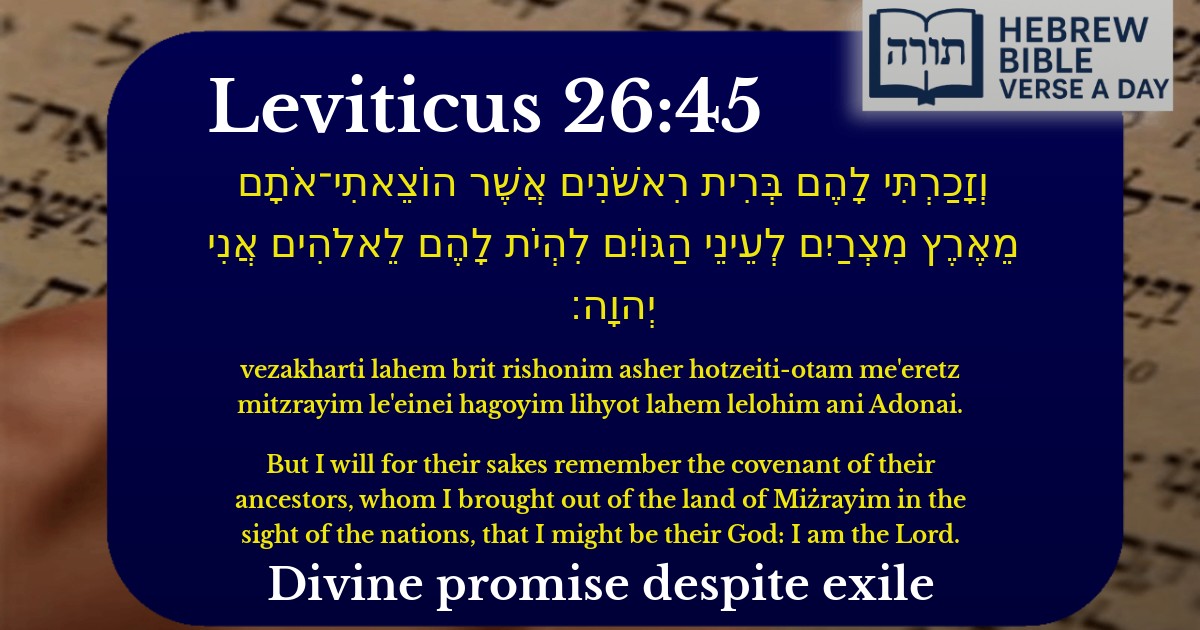Join Our Newsletter To Be Informed When New Videos Are Posted
Join the thousands of fellow Studends who rely on our videos to learn how to read the bible in Hebrew for free!
Hebrew Text
וְזָכַרְתִּי לָהֶם בְּרִית רִאשֹׁנִים אֲשֶׁר הוֹצֵאתִי־אֹתָם מֵאֶרֶץ מִצְרַיִם לְעֵינֵי הַגּוֹיִם לִהְיֹת לָהֶם לֵאלֹהִים אֲנִי יְהוָה׃
English Translation
But I will for their sakes remember the covenant of their ancestors, whom I brought out of the land of Miżrayim in the sight of the nations, that I might be their God: I am the Lord.
Transliteration
Vezakharti lahem brit rishonim asher hotzeiti-otam me'eretz mitzrayim le'einei hagoyim lihyot lahem lelohim ani Adonai.
Hebrew Leining Text
וְזָכַרְתִּ֥י לָהֶ֖ם בְּרִ֣ית רִאשֹׁנִ֑ים אֲשֶׁ֣ר הוֹצֵֽאתִי־אֹתָם֩ מֵאֶ֨רֶץ מִצְרַ֜יִם לְעֵינֵ֣י הַגּוֹיִ֗ם לִהְי֥וֹת לָהֶ֛ם לֵאלֹהִ֖ים אֲנִ֥י יְהֹוָֽה׃
וְזָכַרְתִּ֥י לָהֶ֖ם בְּרִ֣ית רִאשֹׁנִ֑ים אֲשֶׁ֣ר הוֹצֵֽאתִי־אֹתָם֩ מֵאֶ֨רֶץ מִצְרַ֜יִם לְעֵינֵ֣י הַגּוֹיִ֗ם לִהְי֥וֹת לָהֶ֛ם לֵאלֹהִ֖ים אֲנִ֥י יְהֹוָֽה׃
🎵 Listen to leining
Parasha Commentary
📚 Talmud Citations
This verse is not quoted in the Talmud.


Context in the Book of Vayikra (Leviticus)
This verse (Vayikra 26:45) appears in the Tochacha (the rebuke), where Hashem warns of the consequences of straying from the mitzvos but ultimately reassures Bnei Yisrael of His enduring covenant. Rashi explains that despite exile and punishment, Hashem will never utterly abandon His people, recalling the covenant made with the Avos (forefathers) and the Exodus from Mitzrayim.
The Covenant of the Forefathers
The phrase "בְּרִית רִאשֹׁנִים" ("covenant of the ancestors") refers to the promises made to Avraham, Yitzchak, and Yaakov (see Ramban). The Sforno emphasizes that this covenant is unconditional—unlike the conditional covenant at Har Sinai, which depended on Bnei Yisrael’s observance. Thus, even when they falter, Hashem’s promise to the Avos ensures ultimate redemption.
The Exodus as a Foundational Event
Hashem specifically mentions the Exodus ("הוֹצֵאתִי־אֹתָם מֵאֶרֶץ מִצְרַיִם") as proof of His enduring relationship with Klal Yisrael. The Midrash (Shemos Rabbah 1:1) teaches that the Exodus was not merely a historical event but an eternal testament to Hashem’s role as our Redeemer. The phrase "לְעֵינֵי הַגּוֹיִם" ("in the sight of the nations") underscores that this was a public, miraculous demonstration of His power and commitment.
"That I Might Be Their God"
The purpose of the covenant and Exodus is encapsulated in "לִהְיֹת לָהֶם לֵאלֹהִים"—that Hashem is our God, and we are His people. The Rambam (Hilchos Yesodei HaTorah 1:1) explains that this relationship is the foundation of Torah: recognizing Hashem’s sovereignty and fulfilling His will. The Malbim adds that this bond is eternal, transcending time and circumstance.
Conclusion: "I Am the Lord"
The verse concludes with "אֲנִי יְהוָה", affirming Hashem’s unchanging nature. As the Ohr HaChaim explains, this declaration reinforces that His promises are immutable, and His covenant will endure despite Israel’s failings. This assurance is a cornerstone of Jewish faith, as echoed in the daily prayers recalling the Exodus and our eternal bond with Hashem.